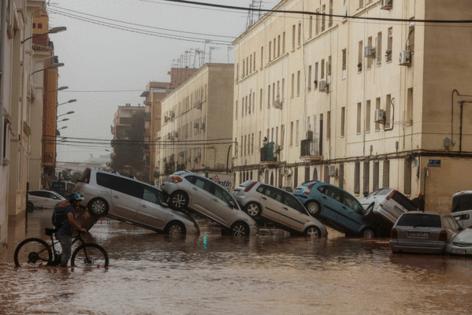Commentary: As climate change worsens, so too will natural disasters. Here's how to pay for them
Published in Op Eds
These days it’s hard to escape news stories discussing how climate change is contributing to extreme weather disasters, including the recent U.S. hurricanes. Aid agencies are increasingly worried about the widespread damage.
A growing question as these disasters worsen in a warming world is how to pay for recoveries, particularly in poorer countries that have contributed the least to climate change.
I am a climate scientist who researches disasters, and I work with disaster managers on solutions to deal with the growing risk of extreme events. The usual sources of aid funding haven’t come close to meeting the need in hard-hit countries in recent years. Groups are developing more effective approaches, in some cases delivering aid before the damage occurs.
Countries typically rely on a few ways to send money and aid to other countries that need help when disasters hit. They can send direct government-to-government aid, contribute to aid coordinated by the United Nations, or support response efforts by groups such as the International Red Cross and Red Crescent Movement.
However, these efforts are almost never enough. In 2023, the amount of humanitarian funding through the U.N. was about $22 billion. The U.N. Office for the Coordination of Humanitarian Affairs estimated that countries hit hard by disasters actually needed about $57 billion in U.N. humanitarian aid to cover resources such as emergency food aid and safe drinking water. This does not include the costs borne directly by residents and their governments as they rebuild.
At the U.N. climate conference in 2022, participating countries agreed to create a new method — a fund for loss and damage, generally defined as consequences of climate change that go beyond what people are able to adapt to.
The goal of the fund is for countries that historically have done the most to cause climate change to provide funding to other countries that did little to cause it, yet are experiencing acute climate-related disasters.
So far, however, the loss and damage fund is tiny compared to the cost of climate-related disasters. As of late September 2024, the total pledges were about $700 million. According to one estimate, the annual costs directly attributable to climate change, including loss of life, are about 150 times that at more than $100 billion.
One goal of the 2024 U.N. climate conference, underway now through Nov. 22 in Azerbaijan, is to increase those contributions. There are still many areas of debate around the loss and damage fund, including whether investing in a country’s resilience to future disasters counts toward it, whether existing financial systems should be used to channel money to countries in need, and what damages are truly beyond the limits to adaptation.
The fund is only part of a mosaic of initiatives. The disaster management community is getting creative about helping countries finance disaster risk reduction and response.
Traditionally, humanitarian funding arrives after a disaster happens, when photos and videos of the horrible event encourage governments to contribute financial support and needs assessments are completed. However, with today’s technology, it’s possible to forecast many climate-related disasters before they happen, and there is no reason for the humanitarian system to wait to respond until after the disaster happens.
A global network of aid groups and researchers I work with has been developing anticipatory action systems designed to make funding available to countries when an extreme event is forecast but before the disaster hits. This can allow countries to, for example, provide cash for people to use for evacuation when a flood is forecast, open extra medical services when a heat wave is expected or distribute drought-tolerant seeds ahead of a predicted drought.
Groups are also developing novel forms of insurance that can provide predictable financing for these changing catastrophes. Without insurance, disaster-affected people usually bear the costs. Experts recommend insurance as a critical part of an overall climate change adaptation strategy.
Traditional insurance, however, can be expensive and slow to assess individual claims. One solution is “index insurance” that pays out based on drought information without needing to wait to assess the actual losses. African nations created an anticipatory drought insurance product that can pay out when the drought starts happening, without waiting for the end of the season to come and crops to fail. This could, in theory, allow farmers to replant with a drought-resilient crop in time to avoid a failed harvest.
Another promising area of innovation is the design of social services that can scale up when needed for extreme weather events. These are called climate-smart social protection systems. For example, existing programs that provide food for low-income families can be scaled up during and after a drought to ensure that people still have sufficient and nutritious food. This requires government coordination among the variety of social services offered and is a promising way to support vulnerable communities in the face of the rising number of extreme weather events.
These novel mechanisms to finance disaster risk are exciting, but they should be coupled with investments in adaptation and resilience so that extreme weather events cause less damage. Communities will need to take steps such as planting different crops, building flood drainage systems and living in adaptive buildings. Managing climate risk requires a variety of innovative solutions before, during and after disaster events.
_____
Erin Coughlan de Perez is an associate professor at Tufts University who researches climate change and disasters. This article was produced in partnership with the Conversation.
_____
©2024 Los Angeles Times. Visit at latimes.com. Distributed by Tribune Content Agency, LLC.




























































Comments